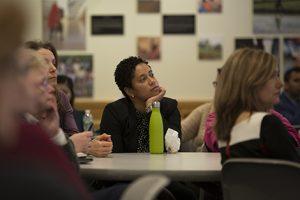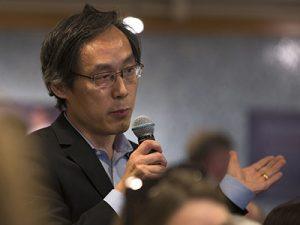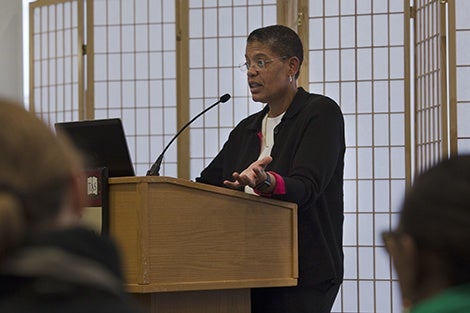March 1, 2017 – Community members at Harvard T.H. Chan School of Public Health think it’s crucial for the School to keep a sharp focus on areas such as the educational experience, financial aid, diversity and inclusion, and infrastructure.
That’s what they told Dean Michelle Williams during her six-month “listening tour.”
Williams gave an update about the tour at a School-wide meeting held February 27, 2017 in Kresge Cafeteria.
Watch a webcast of Dean Michelle Williams’ listening tour presentation
Starting last summer, the Dean held small-group meetings with more than 200 members of the Harvard Chan community and colleagues across Harvard, to learn what people think is working well, what needs improvement, and what their hopes are for the future of the School.
“It was a great opportunity to sit down with interesting, dedicated, and passionate people to talk about the work that is done here at our School,” Williams said.
Supporting the mission
Areas that community members cited as School strengths included its mission, its impact, and the breadth and depth of its research. Others praised the School’s pool of talented researchers, faculty, students, and staff, as well as the work environment of the Longwood community.
 Williams heard positive feedback about successful collaborations among faculty and staff. “It was noted that good working relationships with our colleagues provide a sense of support, particularly in these days of challenge… when it might feel that the nation’s leadership does not support the values that we uphold as core to our public health mission,” she said.
Williams heard positive feedback about successful collaborations among faculty and staff. “It was noted that good working relationships with our colleagues provide a sense of support, particularly in these days of challenge… when it might feel that the nation’s leadership does not support the values that we uphold as core to our public health mission,” she said.
Other efforts seen as working well included programming that has strengthened connections with alumni; a strong commitment to service in several administrative areas, including the offices of Information Technology, Operations, and Research Strategy and Development; and leadership training programs offered by the Office of Education.
In addition, the Office of Diversity and Inclusion received accolades for its robust leadership, responsiveness to the community, and the number of town hall meetings it has sponsored.
‘Hot-button topic’
Among areas of concern, the School’s aging physical infrastructure topped the list for many. “It is a hot-button topic,” said Williams. “As a department chair [of epidemiology] I heard this almost every day. As a Dean I hear it about 10 or 15 times a day.” Although some upgrades and renovations have been made in recent years, the School sorely needs more and better space for teaching, research, and meetings, she said.
Community members also told Williams that the School’s non-centralized governance structure requires some refinement; that financial aid needs a boost; and that career paths should be more clearly articulated, particularly for research scientists.
There is also a strong interest in making practice-oriented education more central to the School’s mission, in expanding community engagement, and in strengthening already solid efforts in diversity and inclusion, Williams said.
Many of the areas of concern mentioned by community members are beginning to be addressed, said Williams. For instance, the Office for External Relations is working on updating fundraising campaign themes to include new areas such as aging and longevity and climate change and sustainability.
The School is also focused on providing more financial support in the form of professorships for faculty and fellowships, scholarships, and financial aid for students and research fellows.
Dealing with new realities
During a question-and-answer period at the end of her presentation, Williams responded to concerns about how the changing political landscape under the Trump administration may impact the School—such as a potential decrease in federal research funds from the National Institutes of Health (NIH).

Williams said that the School has already been focused on diversifying its revenue stream, seeking philanthropic support as well as NIH grants—and that effort will continue, she said. She also suggested that researchers may be more successful at getting grant funding by working in teams that cut across disciplines.
It will also be important in the current political climate for the School to communicate effectively and strategically about the overall importance of public health research, “to push back against the anti-expert, anti-truth, alternative facts rhetoric,” Williams said. “We have to find ways for our School and individuals within our school to amplify our voices.”
In addition to disseminating the School’s work through traditional channels such as high-impact journals, Williams urged community members to become comfortable communicating to the lay public in other ways—by writing op-eds, talking at community town halls, and working with government and policy experts.
“I think we have to be very strategic in thinking about reaching outside of our echo chamber,” she said. “If anything became clear on November 9, it’s that we—the blue parentheses—are not necessarily reaching the vast sea of red that represents [the area] between our two coasts. We have to find ways to better report what we know, and have what we know inform action.”
photos: Sarah Sholes
